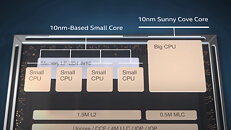Thursday, June 3rd 2021

Intel 12th Gen Core Alder Lake to Launch Alongside Next-Gen Windows This Halloween
Intel is likely targeting a Halloween (October 2021) launch for its 12th Generation Core "Alder Lake-S" desktop processors, along the sidelines of the next-generation Windows PC operating system, which is being referred to in the press as "Windows 11," according to "Moore's Law is Dead," a reliable source of tech leaks. This launch timing is key, as the next-gen operating system is said to feature significant changes to its scheduler, to make the most of hybrid processors (processors with two kinds of CPU cores).
The two CPU core types on "Alder Lake-S," the performance "Golden Cove," and the low-power "Gracemont" ones, operate in two entirely different performance/Watt bands, and come with different ISA feature-sets. The OS needs to be aware of these, so it knows exactly when to wake up performance cores, or what kind of processing traffic to send to which kind of core. Microsoft is expected to unveil this new-gen Windows OS on June 24, with RTX (retail) availability expected in Q4-2021.
Source:
Moore's Law is Dead (Twitter)
The two CPU core types on "Alder Lake-S," the performance "Golden Cove," and the low-power "Gracemont" ones, operate in two entirely different performance/Watt bands, and come with different ISA feature-sets. The OS needs to be aware of these, so it knows exactly when to wake up performance cores, or what kind of processing traffic to send to which kind of core. Microsoft is expected to unveil this new-gen Windows OS on June 24, with RTX (retail) availability expected in Q4-2021.

38 Comments on Intel 12th Gen Core Alder Lake to Launch Alongside Next-Gen Windows This Halloween
yes, you may say it doesn't matter, but that's not true if im trying to get super high frames from older games, which in case I would need the higher performing cores. im sure it will work fine for modern games. but eh. im skeptical.
Halloween [B]:wtf:[/B]
Yeah probably reminds Intel of their 10nm horror run :slap:I think we will see a fair share of issues with programs using the wrong cores? :laugh:
This is not something to get on 1st generation
If we look at this really simply then I would say that MS would make it so that any program defaults to the performance cores and that the program specifically has to mention to the OS that it can run on the ermm Eco? cores to actually make use of them.
The OS itself has plenty of background tasks that can be relagated to the Eco cores and I would imagine browsers and programes like Word would do fine on them as well.
I can even imagine maybe a little menu in Windows where users can drag programs on the system from the performance core tab,bar,section to the eco cores, then start up the program and see how it works, if it works well that info can be send back to microsoft and then they can contact the devs of the program to make an update if they want to run it on the eco cores as standard or perhaps give the users the option to run it on those cores with a little in program switch.
I hope MS did their homework and that Intel did not put too much trust on MS.
If you are playing need for speed underground 1, FOR SURE, you don't need to wake up the big core, since even the little core is similar to a haswell core.AMD will launch zen 3+ on 6nm with V cache.this will be an issue with apps that use avx 512. most of them don't. And the ones that do, well will either use only the HP cores or I don't know what scheme Intel has come up with.
I find it funny how some random people on forums think they know better already then the engineers that have worked a few years on this.
However, AMD is 3D stacking chiplets which makes the big.LITTLE approach irrelevant for at least 1 generation. 15% gains, if true, offer AMD an ace up their sleeve. Smaller nodes and power optimizations will offset the advantage of Intel's big.LITTLE design in no time.
With dual graphics in laptops you're pretty much in double jeopardy anyway, as you both get the stutter problems of integrated graphics and the extra latency of the dedicated GPU streaming the picture back to the integrated one, in addition to the potential problem of running the game on the "wrong" GPU. If you want a completely smooth gaming experience, you have to stick to desktops.While it should be fairly obvious why hybrid CPUs makes little practical sense for desktop users, most still overlook the primary motivation for doing this; marketing. Most desktops are sold through the big PC makers like Dell, HP, Lenovo etc. Buyers of these machines (both personal and business) often look at "specs" when deciding to upgrade. Clock speeds have hit the wall, and boosting core counts with powerful cores in low TDP models is not likely, so these "16 core" "5 GHz" "65W TDP" specs of upcoming Alder Lake is mostly to make it sell easier, ignoring the fact that most users will not understand that these specs are very misleading.Why?
HEDT/high-end workstation and server CPUs will not have a hybrid design, so do you think Microsoft want to sabotage the performance of power users and servers then?
If AMD feels "forced" to do it, it's because of marketing.Where is the spec for this?
How would the OS detect the "type" of an application? (And how would a programmer set a flag(?) to make it run differently?)The small cores will be very slow, and if the details we've seen is right will share L2 cache, which means high latency. They will be totally unsuitable for even an "older" game.Have we got any confirmation on this beyond some APUs?I sure hope AMD would be smarter and skip it all together. I would rather have more cache.